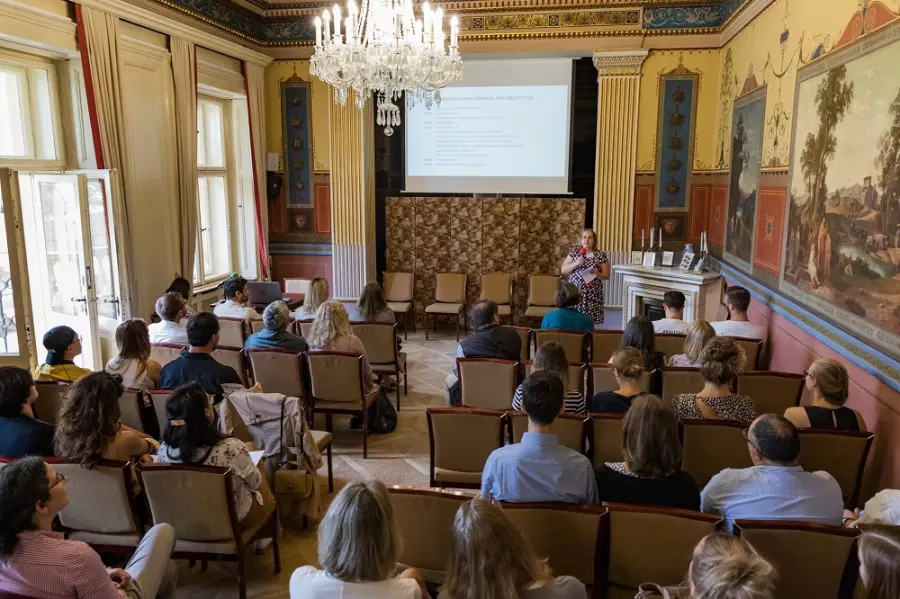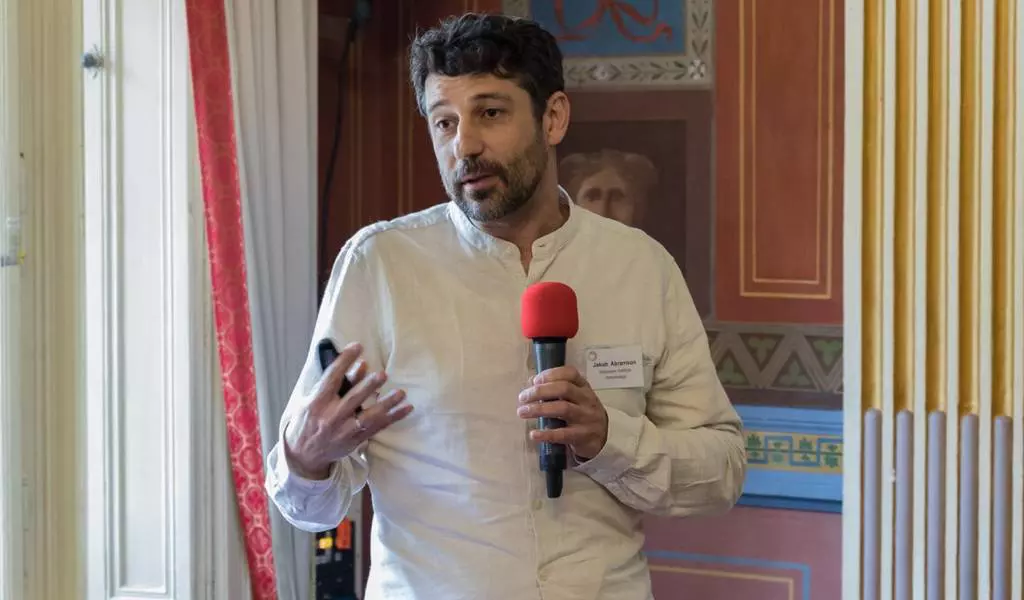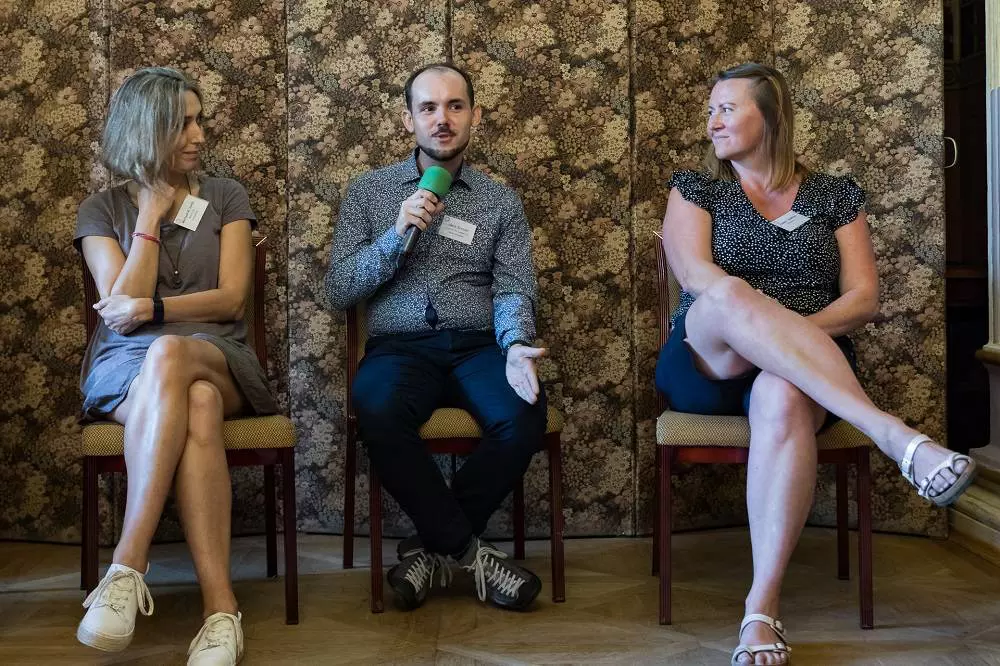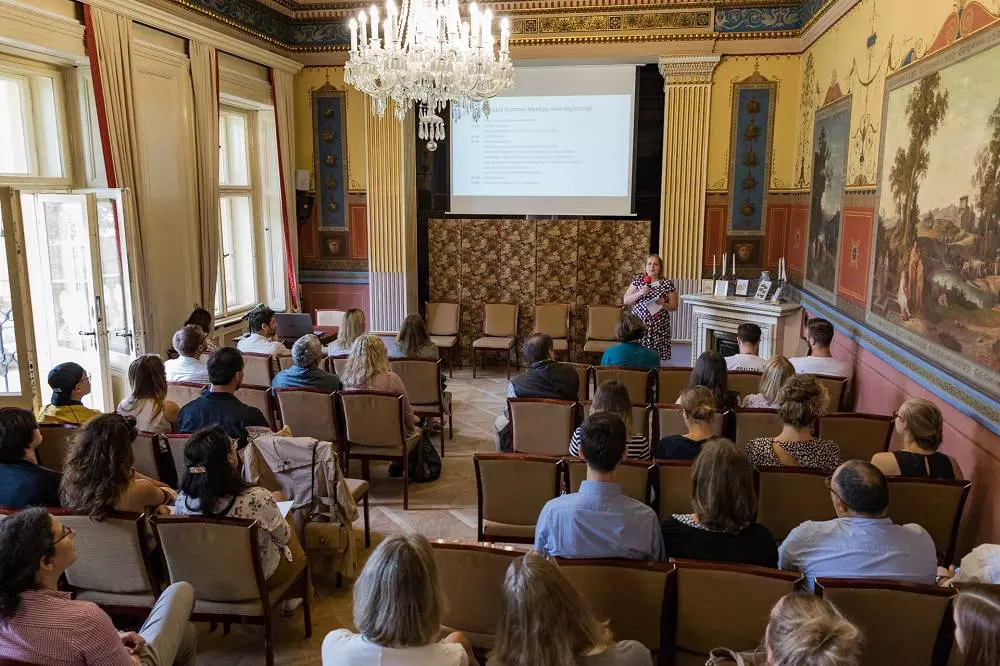
Na konci srpna 2022 uspořádala inciativa Czexpats in Science networkingové setkání vědců, kteří mají zkušenosti s novými začátky v nových zemích a na nových pracovištích. Jaké byly zkušenosti různých vědců a vědkyň? A co v takových situacích radí ostatním?
Jakub Abramson: From Prague around the world and back
Jakub Abramson is a PI at the Weizmann Institute in Rehovot, Israel, with roots in Prague. Abramson described the twists and turns of his research career to date. His first new beginning, following a childhood of books and experimenting, came during his studies when he “understood that for cutting-edge research you need to go far away”. Therefore, he joined Weizmann Winter School, a three-month program for foreign students finishing their Masters degree. He described that this short research experience was probably the most important milestone in his research career, as it subsequently opened the door for his PhD studies at the Weizmann Institute in the field of immunology, describing this period with the words “freedom, fun and friends”.
Later, after encountering “the best paper he had ever read”, in the middle of his PhD he approached his future postdoc PI at a conference and luckily enough was offered a position at Harvard. He was keen to add that at this point, it was crucial that he found the right life partner to share the ups and downs of a scientific career, moving willingly halfway across the world to a new country and another new beginning.
Harvard, recalled Jakub, was in the early stages “learning by shock therapy”. Apart from the language shock, there were the cultural and financial shocks, alongside the lab shock and responsibility shock. The initial hardships soon faded and life settled into a routine and priceless life and scientific experience. Nevertheless, as experienced by many academics, four years into the postdoc came the burnout. With good offers coming in from industry, he was sorely tempted, but his bosses categorically told him no, “you are too much of a free mind to be in industry”.

Jakub Abramson talking about his new beginnings
Hence, he applied back at the Weizmann Institute, succeeded, and was about to start another new beginning as a group leader at the Weizmann. The overarching feeling now was “where on earth are all the soft skills that I need now?”. Turning from “just” a scientist, Jakub suddenly needed to be an HR expert, a PR expert, psychologist, cheerleader, chief financial officer, lawyer, politician and diplomat, writer and stand-up comedian. That is on top of being a good partner and parent as well!
His most recent new beginning is a sabbatical year at the IOCB in Prague, which has just begun. Why would you want to have a new beginning when you are fully established, with your own lab and all that this entails? Well, one of the biggest pluses of a sabbatical is having the luxury of time to think and perhaps write some reviews, as well as providing a break in routine and opening up new perspectives. On a personal front, a sabbatical provides opportunities for family reunions, both with immediate family but also with relatives living further away, such as is the case for Jakub whose parents still live in Prague.
Be well prepared and approach things with an open mind and tolerance as you will almost certainly experience many strange things. Don’t compare yourself to others but to who you were yesterday!
So what are the key ingredients to new beginnings in Jakub Abramson’s view? Firstly adventure and courage to get out of your comfort zone. You certainly need to possess optimism and patience as things won’t happen overnight. It helps to be well prepared and approach things with an open mind and tolerance as you will almost certainly experience many strange things. Have the right expectations and focus on the long term picture instead of the inevitable downs. Most importantly, don’t compare yourself to others but to who you were yesterday!
New beginnings often come unexpected
After a chance to network at the coffee break, the event participants were treated to a series of new beginning experiences by five panellists from a range of different backgrounds, with experienced moderator Eliška Koňaříková leading each of them to share the best bits of their journey with the audience.
Alena Uvizl, a research scientist at DIANA Biotechnologies, first described her move from Czechia to Dresden to do her PhD as part of the DIGS-BB international student programme. Not too far from Czechia, yet far enough to experience a new country, she really appreciated the support she received from the university’s International Office, both during the onboarding process and throughout her PhD. Later during the discussion, all panellists agreed that it is such support to incoming foreign students (or researchers at later career stages) that is immensely helpful. Alena also described her move from academia to industry, weighing up the pros and cons of the move. The good bit of industry is essentially being a postdoc in R&D without the need to worry about funding, the down side being not having the same freedom to explore whatever your idea might be as the company has some priorities. Paraphrasing Frank Buchholz (Professor of Medical Systems Biology at TU Dresden and founder of a spin-off company) as saying that “if you work in a company, you should not fall in love with your project”, Alena expanded this to say that working in industry, you simply “need to have a bigger heart to accommodate other projects”.
If you work in a company, you should not fall in love with your project. But you need to have a bigger heart to accommodate other projects.
Meritxell Alberich Jorda, a PI at the Institute of Molecular Genetics (IMG) in Prague and originally from Barcelona, reflected on a series of chance decisions that took her where she is now. Choosing between architecture, law, art or biology, she picked biology, but it was only on her Erasmus stay in the Netherlands that she really fell in love with it. So much so that she stayed on as a technician; it was only when her work colleagues explained that a PhD would pay better, that she applied and started one. Upon finishing her PhD, a postdoc opportunity came up at a conference so she was off to Harvard next. After some time, though, a period of burnout arrived and Meritxell chose to move to industry, with a Czech company being chosen. However, first she jetted off on a travelling break around Europe only to find at the end of it that the position no longer existed by the time her job was supposed to start… OK, what next? Taking a technician position in the lab of someone else, she was able to start, but was allowed to apply for and receive her own funding and eventually apply for an open junior group leader position at the IMG in her own right. Her story demonstrates that scientific careers are not always as straightforward as they look from the CV.
Scientific careers are not always as straightforward as they look from the CV.
Jakub Šindelář is a graduate researcher into First World War representation in historical computer games. He discussed both his own new beginning at Leiden University and also the role of the Czech Association of Doctoral Researchers (ČAD), where he is the vice-chair, plays in supporting PhD students in the Czech Republic, including those from abroad. He discussed the positive benefits of onboarding processes to help those new to a country, and how it helps to be acknowledged as a fully fledged member of the research community and not as “just a student”. His words of advice, on finding the right supervisor, was to treat the interview as if it was you interviewing your potential mentor and not just the other way round. “This person will have a lot of power over you and your career for 3-5 years, so the match should be a good one.”

Meritxell Alberich Jorda, Jakub Šindelář, and Zuzana Tuťálková (from left) during the panel discussion
Oleksandra Rieznyk, a PhD researcher in Agroecology at the Czech University of Life Sciences in Suchdol (CZU), is originally from Ukraine. Her first new beginning, after realising that her teaching job in Kiev no longer paid enough, was to retrain as a teacher of English. Her first stint abroad was in Kazakhstan, which was certainly by no means a place of “deserts, camels and nomads”, but a very ambitious, more Dubai-like place. The originally planned 4 months turned into several years and it was only the covid crisis, which led to the realisation that coming closer to home might be a good idea. Here came the next new beginning as a journey “westwards” ensued to start a Master’s, and later a PhD in Prague. Being dropped off one evening during the December 2020 lockdown in the middle of the CZU campus in the dark was a bit of a start at the deep end. Fortunately, Oleksandra found her way to her allocated dorm. “Every time you decide to go abroad, think about it – things will go wrong, but do it anyway – there will be good things in the end”, sums up Oleksandra. She was due to start acting as an ambassador to encourage students from Ukraine to come and study at the University but the ongoing war has put a stop to this endeavour temporarily. Nevertheless, in future, with key experience in Agroecology, Oleksandra plans to be involved in the effort to rebuild her country when the war with Russia ends.
Every time you decide to go abroad, think about it – things will go wrong, but do it anyway – there will be good things in the end.
Zuzana Tuťálková, a visa support worker at Euraxess, introduced the audience to the services that Euraxess provides to foreign researchers. Before arrival, they take you through all the documentation that you need to complete, then all the things you need to do once you are in Czechia and finally help you with informing the Ministry of the Interior of changes that occur during your stay. Although they cannot do things such as find you a doctor, school, accommodation or open a bank account, Euraxess can and do provide you with information that will help with these so that you can get support from your colleagues to arrange all these. During the early months of the Ukrainian refugee crisis, Euraxess, with support from the Ministry of the Interior, were able to provide help with visa issues also to family members of Ukrainian researchers already in the country.
Don’t be afraid of new beginnings. Be humble but proud
So what about the take home message? What was the advice from the speakers for those looking to try something new? “Don’t compare yourself to others, just do your best,” said Meritxell Alberich Jorda, who also added that “Once you learn it’s OK to be rejected, it’s fine.” “Don’t be afraid of new beginnings and trust yourself,” was the advice from Alena Uvizl, while Oleksandra Rieznyk suggested to look at YouTube videos of the place you are going to and to write to future colleagues. Finally Jakub Abramson closed off with a bunch of good advice. “This will make you grow,” he said. “Try to get out of your comfort zone. Think big. Pick the best lab in your field. The new beginning will be tough, but you can learn from it and get through to benefit in the end. Be brave. Be humble but proud.”
Czexpats in Science are grateful to our supporters, who made the event possible. These are DIANA Biotechnologies (our general partner and partner of the meetup), Contipro (our main partner), Euraxess (partner of the meetup), Bakala Foundation (partner of the Ukrainian researcher support project).
Zdroj: CZEXPATS in Science
- Autor článku: ne










































